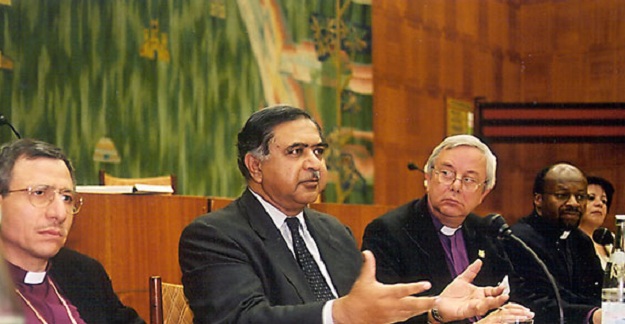Dr Kamal Hossain is an eminent Bangladeshi jurist, statesman and politician. He was arrested by the Pakistani authorities in 1971, during the Bangladesh Liberation War. After his release he went on to serve with the new Government of Bangladesh as Minister of Law and later Foreign Minister. He is still politically active as President of the Gano (People’s) Forum.

How did you become involved in Bangladesh’s Liberation War and what were the circumstances of your arrest?
I was drawn into the national movement against military rule imposed by the Proclamation of Martial Law in 1958. This movement developed into one for regional autonomy, fuelled by a sense of injustice resulting from disparity and discrimination. My engagement became stronger as I became involved in court cases against repressive measures and in advocating constitutional changes.
On 25 March 1971 (as the Pakistan military crackdown began), I left home to avoid arrest and moved from house to house for about a week before I was arrested during a city-wide curfew.
Terrible crimes were committed, including mass rape, murder and wholesale destruction. Yet in subsequent years you have been seen as a conciliatory figure in relation to Pakistan. How should societies like South Africa, Sri Lanka and Northern Ireland deal with the crimes of the past?
There is no question of being seen as a conciliatory figure in relation to war crimes. The collection of evidence had started when I was law minister and I was directly involved in the drafting of the 1973 International Crimes (Tribunal) Act under which the Tribunal is currently trying war crimes. Many of us are keen to promote regional cooperation in South Asia, and creating a framework for countries of the region to work together should help change the hostility that is a legacy of the past.
The situation in each country calls for effective measures that respond to the demands for justice by victims and, indeed, by an entire society where the scale had been so enormous, as in Bangladesh.
The new Bangladesh Government was quick to apply for Commonwealth membership. Why was membership important to Bangladesh?
Membership of all international organisations and recognition by other countries were priority objectives for the new state. The active involvement of Bangalis in the UK in the liberation struggle – and the fact that the first state which received Bangabandhu as head of state was the UK, where Prime Minister Heath met him on his release from prison in Pakistan – explains why the Commonwealth was the first international organisation that admitted Bangladesh in the face of Pakistan’s threat to withdraw.
With regard to the constitution, the Commonwealth extended technical assistance by making available the services of a parliamentary draftsperson. Secretary-General Sonny Ramphal also supported the holding of a conference of constitutional experts in Oxford to discuss the draft constitution.
Did the bloody and violent nature of Bangladesh’s birth leave an internal legacy in terms of authoritarian rule?
The explanation is more likely to be found in the refusal of the defeated forces of 1971 to accept the reality of Bangladesh. This prompted them to continue hostilities, to obstruct its recognition by the international community and, ultimately, to the assassination of the leaders of the independence movement in 1975.
You have an international reputation and still work around the world, but are you also involved in Bangladeshi politics?
As a concerned and conscientious citizen, I am associated with the continuing efforts to build a working democracy and I have been involved with political movements to promote national consensus on upholding the basic principles of the constitution.
What is the relevance and role of the modern Commonwealth?
Given its composition, the Commonwealth has resources, particularly in relation to developing democratic institutions and the rule of law, that can be drawn upon by members. This was true in the emergence of the new South Africa and also in promoting and protecting human rights when these were assailed in member countries such as Nigeria and others. The effectiveness of the Commonwealth’s role is dependent on the political will of its members and, to a degree, on the personality and resourcefulness of the Secretary-General.
Interview by Stuart Mole





